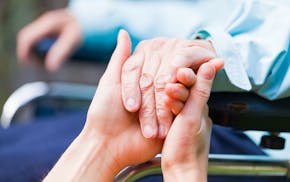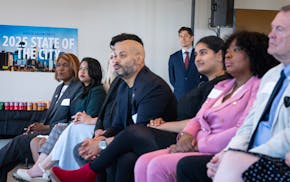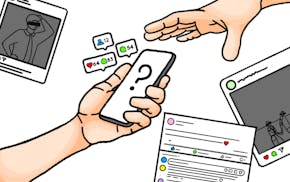Opinion editor's note: Strib Voices publishes a mix of material from 11 contributing columnists, along with other commentary online and in print each day. To contribute, click here.
•••
The day was a microcosm of what I imagined many immigrant journeys to be: a swarming mass of people, trudging slowly on foot as blustery wind blew outside, in temperatures colder than it ever gets in most of their home countries. We were ushered into long and winding lines, with little certainty about what lay ahead.
Official-looking men and women wandered around, some of them wearing law enforcement uniforms and ushering us forward, checking our bags.
I was alone, sandwiched between a mixed-race group of friends who looked to be in their 20s and 30s and an older white couple behind me. As we neared the front door, a few women made the classic sidling cutting-ahead-in-line move, suddenly overjoyed to see someone they knew at the head of the line.
I found myself feeling irritated, remembering a Larry David skit about line cutters. He called it a "chat and cut." I rolled my eyes, but I didn't say anything on that windy November afternoon. America's recent rancorous politics and presidential election left me feeling less than comfortable raising issues with strangers. Everyone seemed a bit more on edge than usual. You never knew who would react poorly, who might pull out a gun. So we all stared straight ahead and walked along in queue.
The line behind us stretched farther than I could see at the moment. I'd find out later that more than a thousand of us were gathered in Brooklyn Center to witness 501 new American citizens take their oaths and receive naturalization documents.
Of course the new citizens well knew that the lines for immigration to America are not fair ones, either. People are cutting in all the time, sometimes on the basis of wealth, sometimes on the basis of family connections or education. Sometimes on the basis of need, but that didn't always work out neatly. How do you determine which country's people had the most meritorious suffering?
As we entered the large, industrial-feeling space filled with folding chairs, the first several rows reserved for new citizens, a low hum of excitement and anticipation filled the air. Two large projector screens stood on either side of a podium in the front of the room, with images of the American flag and the Statue of Liberty.
Celebrate Citizenship. Celebrate America, it read.
The 501 new Americans represented 76 home countries. To my left sat a young man from Kenya, sitting next to his son, who flashed me a quiet few fingers when I asked his age. The little boy's mom was receiving her citizenship that day. Her husband told me he was hoping to receive his citizenship in a few months, too. While the mom waited to take her oath, their baby, just a few months old, clung to her chest. Mom and Dad would swap kids midway through the ceremony.
A parent of two young American boys myself, I was reminded of how we parents parent through whatever circumstances we find ourselves in. Traversing the world on a quest for a better life for our children, in the midst of our lowest lows and highest highs: diapers needing to be changed, kids needing to be fed and rocked to sleep and comforted. All over the world, sometimes against all odds, kids grow up and become adults. Thank God.
These young boys to my left would represent the next generation of Americans: among the first-generation immigrant kids who often carry the weight of their parents' and their country's great expectations.
They would do so today in a country that had just elected a president who had called immigrants "bloodthirsty criminals" and the "most violent people on earth" who are "ruining the fabric" of our country and its culture (whatever that means). He spoke of "illegal alien gang members" from "prisons and jails and insane asylums."
In the wake of Trump's re-election, some Democratic voters in blue states Googled their options about moving out of the country, and they renewed their passports.
Still, these 501 newly minted Americans came to Brooklyn Center and swore an oath that they would "support and defend the Constitution and laws of the United States of America." That they would "bear arms on behalf of the United States … perform noncombatant service in the Armed Forces of the United States when required by law … ."
I wondered how both things could be true: that these people swearing this oath on this day, after the re-election of this president, could be willing to give so much to a country that had so often been willing to crush them under its heavy boot.
How could it be that African immigrants, like this man and his family sitting next to me, could so proudly applaud the Stars and Stripes, when less than two centuries earlier Africans had been brought to this country in chains? When the dark stain of racism still reigns across these United States, in police violence, in schools, in job interviews, in sports, in politics?
The names of each country represented that day were read aloud by presiding Judge William J. Fisher, and when they were read, the immigrants representing that country stood and waved their handheld American flags. We began with Afghanistan and Australia, then moved on to Samoa and Saudi Arabia and Russia and Congo and Germany. So many places all over the world. One of the largest groups to be announced toward the beginning was from Honduras, but they were quickly outnumbered by China, and then India, Liberia, Somalia, Ethiopia (to loud cheers), and finally Mexico. Mexico — our much-maligned neighbor to the south, the border for which we are constantly told must be secured — had the largest group of all.
Judge Fisher did his best to make this day one of joy and soaring rhetoric, to call to mind the America of former Presidents Ronald Reagan and John F. Kennedy, both of whom he quoted favorably. He told the new immigrants that they should hold onto their love for their native lands, that sharing their cultures with us enriches everyone in America.
"Our strength lies in the diversity of our people," he said. "You are equal to anyone who was born here, and to anyone who can trace their ancestry back 300-400 years."
"There is no single American way to think or believe," he added. "Conformity of belief or thought would be contrary to the beliefs and principles of this nation."
I watched Judge Fisher valiantly strive to express the American dream, and it brought to mind the Dutch story of the little boy desperately thrusting his thumb into the hole in the dike as the water came rushing in. Were we the America of these immigrants' dreams? Or the America of their nightmares? Of our own nightmares?
I smiled broadly when my friend Ruth stood with the rest of the new immigrants to take her oath. She was so happy. She had studied for months for her citizenship test. She had invited me there that day as a witness. And so I did my best, recording all of the joy and sorrow and the mixed emotions, including my reluctant noticing that some in the room chose not to stand for the pledge or for the national anthem.
In this post-COVID America of screens and AI and algorithms and Amazon, we are too rarely thrust together with our fellow Americans, especially with people who come from places other than we do. Many in the room for the ceremony were repeat attendees, as their family members were able to sponsor one another and add more citizens to their extended clan. But I had never been to a naturalization ceremony before. Like many white Americans, I had become distanced from my family's own immigration story. I'm sure I took my citizenship, and what it gave me, for granted. How could I not?
I had rarely reflected on my own place in that line with all those waiting to write our own American stories. But we were indeed standing together. We have no other choice in this country of dreamers and dissidents, of believers and con artists.
I mentioned the young Kenyan American family seated to my left. I did not say who was seated to my right. It was, to my initial chagrin, the same women who had cut in line ahead of me. Now we were crammed tightly together on folding chairs. We exchanged awkward glances and moved in and out of each other's way. I assumed we were both holding tightly to our own resentments.
At the end of the ceremony, we all turned to find our loved ones who had that day become citizens. Soon we'd be out of that place and back to the places that maybe felt more comfortable, with people who seemed more familiar.
I turned to my right. With a few words of introduction, of welcome, of kindness, we set down our shared resentments and picked up our own version of American hope, knowing that we would need one another in these perilous years ahead.

Rash: At home, Jake Sullivan reflects on events abroad

Opinion: Let's not lose sight of what's best for older adults

Readers Write: Minneapolis politics, Trump's budget, hot tub rentals
